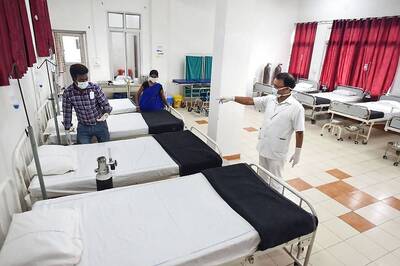
views
When demonetisation was announced in 2016, Nirav Modi was busy collecting old 500 and 1,000 rupee notes, allegedly using his employees to deposit Rs 300 crore worth of old notes as their personal savings and subsequently adjusting them in their salaries, a new book on the fugitive diamantaire has claimed.
Written by journalist Pavan C Lall, Flawed – The Rise and Fall of India’s Diamond Mogul Nirav Modi by Hachette India explains the modus operandi allegedly adopted by the third-generation diamond merchant.
Lall meticulously records the Nirav Modi saga – ranging from his arrest on international soil, rejected bail pleas, extradition theatrics and the frenzied pursuit of diamond-trading minutiae by investigative agencies across three nations. The book recounts in close, compelling detail the rise of a global player and his equally dramatic fall. Arresting and revelatory, it raises indispensable questions about how one man’s drive to succeed at all costs can jeopardise an entire ecosystem.
Sample this. Soon after the note ban on November 8, 2016, a New Delhi-based customer of Nirav Modi and his wife received a text message from one of Modi’s junior sales associates that read, ‘We accept old notes’, for a business where cash transactions are common, demonetisation was an unthinkable that happened.
Lall goes to explain how Nirav Modi worked. “After the note ban, the government allowed citizens to deposit old banknotes in banks as long as they furnished their identification. Those account holders with, say, a million rupees in their account wouldn’t draw too much attention from the tax man if they deposited just two or three lakhs, but a deposit of, say, another million rupees that had never been made before would raise a red flag.”
The author adds, “In that context, it was far easier for an enterprise aiming to clean up unaccounted cash to distribute, say, a million rupees among 20 employees who would claim that the money was their personal savings. The result was a win-win for all concerned: the merchant, the employee and the person to whom the money belonged.”
Based on personal encounters, incisive interviews and meticulous research, Lall’s riveting narrative deciphers the incredible twists and turns of Nirav Modi, who moved from Belgium to India to apprentice with his uncle, Mehul Choksi (also caught in the net). The story of a diamond merchant with extensive connections; of an astute businessman whose firm grip over an intercontinental supply chain saw his branded jewellery stores dotting not just every Indian metropolis but also marquee locations such as London, New York and Hong Kong is an eye-opener.
According to the author, few months after demonetisation, a story began doing the rounds that there was a full-scale raid in progress and that it was being conducted not just on Nirav Modi but also on his close associates. While it was not verified, an official with a law firm estimated that the diamond merchant converted at least “Rs 300 crore’ in this manner. A raid in Indian business parlance is essentially a search and survey operation that is conducted by the Income Tax department when it receives a tip-off that a person or corporation is or has been hoarding ‘black money.’
Incidentally, it was not the first time Nirav Modi had faced raids. Sometime in 2013, the National Investigation Agency and the Income Tax department carried out a joint operation in Mumbai. It led to a haul of diamonds, cash and bullion worth around Rs 200 crore. Those raids happened at Mumbai Central station after the authorities zeroed in on four trucks from which over a hundred bags were seized, and the people in the vehicles, including the drivers, helpers, office, peons of diamond traders and angadias, unregulated couriers who offer illegal banking services, were taken into custody.
The Income Tax department had seized cash, jewellery and documents that allegedly indicated evasion by his companies. The offices of the Gitanjali Group were also checked out in connection with the ongoing investigation. Once again, Modi was not able to shake off his association with Choksi. The fact that his uncle was also lobbing up a company for an IPO while Modi was doing the same heightened the scrutiny on him. There was also an ongoing spate of news about some of Choksi’s former jewellery dealers going on tirades about how they had been short-changed by Gitanjali on gold loan schemes.
Nirav Modi, his uncle Mehul Choksi and other family members are under the scanner of the Indian agencies for their involvement in the Rs 14,000 crore Punjab National Bank (PNB) scam.
The CBI is probing criminal charges against all the PNB accused under the Prevention of Corruption Act and Indian Penal Code. Both CBI and ED have also requested Interpol to issue notices against people involved in the PNB scam, including Nirav Modi, Mehul Choksi, Aditya Nanavati and Mihir Bhansali.
Author Lall claims that Nirav Modi was actively in charge of the debtor companies as well as their day-to-day operations at least until 2012, until such time as he got deeper and deeper into expanding his retail label worldwide. According to the US Examiner's report, numerous emails show Modi was also involved with the shadow entities. Indian officials stated that his associate Mihir Bhansali managed these shadow entities.
A spreadsheet set forth in one page the total payables and receivables among Modi’s firms, the Firestar entities and the shadow entities in Hong Kong and Dubai, as well as the Firestar contact acting on behalf of the various shadow entities. Indian authorities claimed that Bhansali was a co-conspirator who helped Modi orchestrate the LoU fraud and during his tenure hundreds of millions of dollars passed through the companies. Evidence obtained by the examiner was consistent with those allegations, concludes Lall.
(The author is a visiting Fellow with the Observer Research Foundation. Views are personal)

















Comments
0 comment